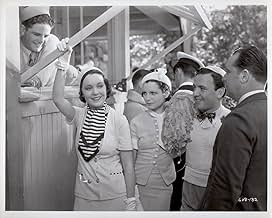Adicionar um enredo no seu idiomaAfter Nina Leeds finds out that insanity runs in her husband's family, she has a love child with a handsome doctor and lets her husband believes the child is his.After Nina Leeds finds out that insanity runs in her husband's family, she has a love child with a handsome doctor and lets her husband believes the child is his.After Nina Leeds finds out that insanity runs in her husband's family, she has a love child with a handsome doctor and lets her husband believes the child is his.
- Prêmios
- 3 vitórias e 1 indicação no total
Avaliações em destaque
For the screen the voice over regarding the thoughts is used for all the characters. It probably is a technique better suited to the screen. Sir Laurence Olivier did very well with it in his version of Hamlet. But Bill Shakespeare gave Olivier a lot better story than O'Neill gave his players in this instance.
Players like Clark Gable, Norma Shearer, Ralph Morgan, May Robson, etc. are a lot more animated in most of their films than they are in Strange Interlude. The story takes place over a 20 year period. Norma Shearer is a young woman whose intended is killed in World War I. She starts playing around quite a bit, although that part is not shown in this version. She makes the acquaintance of Alexander Kirkland and his friend Clark Gable. She also has as a perennial suitor, Ralph Morgan, a friend of her father's Henry B. Walthall.
She marries Kirkland, but then is warned by his mother May Robson and shown that insanity gallops in that family to quote another literary work. Since Kirkland wants kids and Shearer and Robson think Kirkland's train will slip the track if he doesn't get one, Gable is recruited for breeding purposes. Of course you can see all the complications this can cause and O'Neill explores them all.
Gable is so terribly miscast in an O'Neill production, but he was an up and coming player at MGM and did what they told him. Shearer does what she can to lift a very dreary story, but she seems defeated at the start. Best in the film is possibly Robson who puts some real bite in her dialog.
Strange Interlude ran for 426 showings on Broadway in 1928-1929 and starred Glenn Anders and Lynn Fontanne in the Gable and Shearer parts. Perhaps no one could really have saved the film because two years earlier, Groucho Marx lampooned the stuffings out of it in Animal Crackers. After seeing what he did, I don't think the movie going public took it too seriously.
And since it's not the best of O'Neill, neither could I.
For this movie version, Robert Z. Leonard has the performers reveal their "inner thoughts" in voice-overs. You will recognize the technique, which is not unusual (in smaller doses). In this film, the voice-overs are a distraction - for the most part, they reveal nothing the cast can't reveal through cinematic acting. Mr. Leonard should have considered aborting the spoken asides. Obviously, Norma Shearer (as Nina Leeds) and her stellar co-stars are capable of revealing their "inner thoughts" in close-up - so, the voice-overs are superfluous.
The film is about Shearer's love for four different men: the idealized "Gordon Shaw" (an unseen World War casualty), darkly passionate Clark Gable (as Ned Darrell), popular and successful Alexander Kirkland (as Sam Evans), and ever unrequited Ralph Morgan (as Charlie Marsden). The men have exquisitely trimmed moustaches. Shearer marries one of them - but, fearing heredity insanity will befall her child, she gets herself pregnant by another. The film does not explicitly reveal that "Nina" aborted her first pregnancy.
Photographer Lee Garmes, art director Cedric Gibbons, and the MGM crew make the production look first class all the way. Henry B. Walthall (as father Leeds), May Robson (as mother Evans), Tad Alexander (as young Gordon), Robert Young (as older Gordon), and Maureen O'Sullivan (as Madeline) offer outstanding support. Just try to edit out the "strange interludes" in your mind...
******* Strange Interlude (12/30/32) Robert Z. Leonard ~ Norma Shearer, Clark Gable, Alexander Kirkland
Você sabia?
- CuriosidadesWhen Maureen O'Sullivan first met Clark Gable on the set, he was in his old-age makeup. He asked her out on a horseback-riding date, but thinking he was too old for her, she turned him down. Later when she was doing some voice-overs, she saw him without makeup and regretted her decision. Gable never asked her out again.
- Erros de gravaçãoAfter Charlie's last line, a shadow of the boom microphone can be seen moving off the back of the wicker chair before the camera starts pulling back.
- Citações
Nina Leeds: [Inner thoughts] You do love me, Ned.
Dr. Ned Darrell: [Inner thoughts] I don't love you.
Charlie Marsden: [Inner thoughts] Darrell and Nina. There's something unnatural here. Love and hate and lust! Where's Sam? Why isn't he here? I hate Nina! I must punish her!
- ConexõesReferenced in Hollywood Hist-o-Rama: Norma Shearer (1962)
- Trilhas sonorasSymphony No.5 in E Minor, Op.64
(1888) (uncredited)
Written by Pyotr Ilyich Tchaikovsky
Excerps from the second movement played during the opening credits
Principais escolhas
- How long is Strange Interlude?Fornecido pela Alexa
Detalhes
- Data de lançamento
- País de origem
- Idioma
- Também conhecido como
- Strange Interlude
- Locações de filme
- Santa Catalina Island, Channel Islands, Califórnia, EUA(regatta scenes)
- Empresa de produção
- Consulte mais créditos da empresa na IMDbPro
Bilheteria
- Orçamento
- US$ 654.000 (estimativa)
- Tempo de duração
- 1 h 49 min(109 min)
- Cor
- Proporção
- 1.37 : 1
































